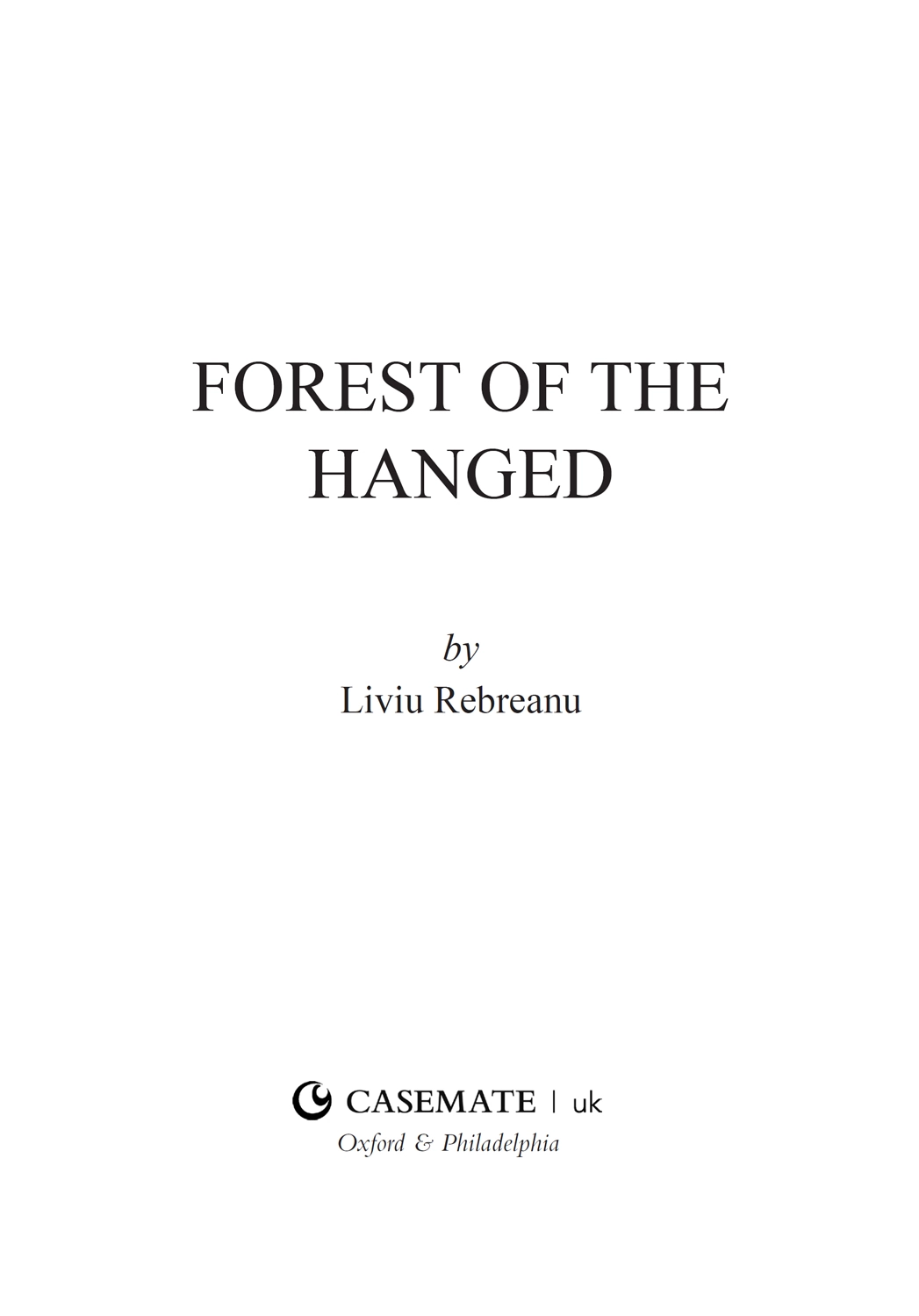Forest of the Hanged


In remembrance of my brother Emil, who was hanged by the Hungarians on the Rumanian front in the year 1917.
L. R.
BOOK I
I
UNDER the ashen autumn sky, which resembled a giant bell of smoked glass, the brand-new gallows reared its head defiantly on the outskirts of the village and stretched its arm with the halter towards the dark plain, dotted here and there with copper-leaved trees. Superintended by a short, dark-skinned corporal and assisted by a peasant with a hairy, red face, two old soldiers were busy digging a grave. They spat frequently into the palms of their hands, and groaned with fatigue after each stroke with the pickaxe. From the wound in the earth the diggers threw out yellow, sticky clay.
The corporal twirled his moustaches and stared contemptuously around him. The scenery oppressed him, though he tried not to show his vexation. On the right stretched the military cemetery, ringed in by barbed wire, with its graves arranged as if on parade, the white crosses new and uniform. On the left, a few steps away, began the villagers’ cemetery, overgrown with nettles, gateless, the crosses sparse, broken and rotten. It looked as if no dead had been buried there for years, and as if none would ever be buried there again.
The village Zirin, headquarters of the infantry division, hid itself under a pall of smoke and fog, through which the scattered, leafless trees, the few thatched roofs, and the church tower, split by a shell, poked their timid heads. On the north side the ruins of the station and of the railway line blocked the view like a dyke without beginning and without end. The highroad, marked out in a straight line on the dreary plain, came from the west, passed through the village and ran right out to the front.
“What an ugly country you have, Muscovite!” said the corporal, suddenly turning towards the diggers and casting a baleful glance at the peasant, who had stopped to breathe. “Do you hear? Country … places … niet pretty!” he added, pointing at the landscape and raising his voice to make himself better understood.
The peasant stared at him with perplexed eyes and, smiling humbly, muttered something in Russian.
“He doesn’t understand our tongue, corporal,” volunteered one of the soldiers, straightening his spine.
“Well, it isn’t their fault, anyhow, that theirs is such a rotten country,” said the other soldier, leaning on his spade.
All three soldiers now stared very contemptuously at the peasant, who, not understanding the foreign words, bent shamefacedly over the yellow hole, which had now a depth of about half a metre.
“Here, what do you mean by stopping, you lazy beggars!” exclaimed the corporal all of a sudden, remembering his duty. “Call this a grave? Aren’t you ashamed of yourselves? The convoy will be here in a minute and the grave isn’t ready. Or is it that you want me to get into trouble? Now then, you, put your back into it and stop gaping at me!”
“You’re right, corporal,” mumbled one of the soldiers, tackling a huge lump with his pickaxe. “But that’s not army work, corporal.… To think that we should have come to be grave-diggers.… Well …”
The men fell to work with a will, and the corporal, appeased, answered once more in quite a friendly tone:
“A soldier’s duty in war-time is to do any job that comes to hand. That’s why war is war. Here, or at the front, or in the hospital, it’s all in the war. Why don’t you say instead how lucky we were to be delayed.… What on earth should we have done with ourselves if we had arrived at four as the orders were? We should have been jolly fed up, all of us.… But I’ll say one thing: I am an old soldier, but never till now have I heard of people being hanged like that, almost in the dark.”
He broke off abruptly. His eyes had fallen on the gallows, whose arm seemed to threaten the men standing in the grave. And just then the halter began to-swing gently. The corporal, with a cold shudder, turned his head away quickly, but his eye fell on the straight line of white crosses in the military cemetery and, greatly agitated, he left-about-turned, only to face the graves in the village cemetery. Fear gripped him as if he had come face to face with ghosts. He recovered his self-control quickly, however, and, spitting to show his disgust, muttered:
“What a life this is! … Wherever you look, there is nothing but the dead and the graves of the dead.”
An autumn wind, damp and dreary, began to blow from the direction of the village, swallowed in fog, carrying on its wings echoes of unending moans. The unutterable loneliness, which seemed to drop from the grey sky, oppressed the corporal so much that he stood there as if turned to stone, staring at the church tower and so lost to his surroundings that he did not notice that an officer was approaching on the road leading to the cemetery. He only roused himself when he heard the sound of footsteps. Startled, he turned to the grave-diggers and said, his voice still hoarse with uneasiness:
“Hurry up, boys, an officer is coming.… The convoy won’t be long now.… Phew! If only we could finish and be done with it! … Say what one will, this is not work fit for soldiers.…”
The officer approached unsteadily. The wind fluttered the flaps of his top-coat and seemed to drive him towards an undesired goal. He was of middle height and had a little beard, which gave him the appearance of a militiaman, though he did not appear older than about thirty-five. Under the rather wide-brimmed steel helmet his round, fair face looked troubled, the large, brown, protruding eyes were fixed apprehensively, in an unblinking stare, on the gallows. He seemed to find a morbid, insatiable interest in it.
1 comment